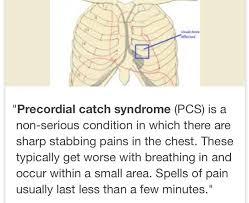Results: What Is That Sharp, Stabbing Sensation You Sometimes Feel In Your Chest?
Published on 06/25/2019
QUESTIONS
GO to COMMENTS
Comments
1.
1.
If you have ever experienced a sharp and sudden pain in the chest, you may have thought "heart attack" or something else serious. Then the pain went away, but the next time it happened, those thoughts may have returned. Have you ever had this pain?

No
47%
1040 votes
Yes
48%
1069 votes
Yes, and I knew what it was
6%
125 votes
2.
2.
Most likely it was a condition called precordial catch syndrome (PCS). And the good news is that unlike a heart attack, it is not harmful or even life-threatening. Unlike a heart attack, the pain does not radiate or "spread" to other areas of the body. And, again, PCS won't cause other symptoms – such as drenching or vomiting, for example. Instead, the pain is localized to an area to the front or side of the chest usually no bigger than one to two fingertips wide. Hence the name "precordial", meaning "in front of the heart". Breathing can make the pain more intense and some people find shallow breaths can help blunt symptoms. Others say one deep inhalation can provoke a "popping sensation" that resolves the issue, "fixing" things. PCS disappears just as quickly and suddenly as it arises, with sessions usually lasting between 30 seconds and three minutes. Precisely what sparks an attack is not clear, but most experts think the pain is caused by the irritation or pinching of nerves in the chest cavity's inner lining (the pleura). It is not, however, caused by damage to the heart or lungs. Have you ever gone to a doctor complaining of these attacks?

Yes
12%
264 votes
No
63%
1414 votes
I was going to
4%
99 votes
Have not experienced these attacks
20%
457 votes
3.
3.
As scary as this symptom can be, other symptoms can sometimes be thought of as quite serious, but often are not at all. Just like any health issue, if it concerns you, by all means consult with a health care professional. Have you ever experienced any of these symptoms?

Ringing in your ears might just be a symptom of normal aging. When your arteries harden or you have high blood pressure, the blood flow changes and creates noise that only you can hear.
31%
701 votes
If your hands are shaking, don't assume the worst. Parkinson's often starts on just one side of the body, and would be paired with stiffness, slow movement, and loss of coordination. It could be low blood sugar or a thyroid problem, or it could be an essential tremor, which is unsettling but benign.
17%
379 votes
The older you get, the more you start to fear it may be sign of dementia when you forget a name or where you put your keys. Thankfully, you can rest easy knowing it's totally normal not to stay so sharp during aging, and even younger people can sometimes experience memory slips when they're stressed.
33%
743 votes
It can be scary to suddenly notice black "floaters" in your vision, but they don't mean you're on your way to vision problems. They're more age-related than anything.
33%
729 votes
Unexpected blood might concern you, but especially in younger people, rectal bleeding is usually nothing serious, Usually they have a low-fibre diet and are a little constipated. If it doesn't go away after you start drinking more fluids and eating extra fibre, talk to your doctor.
12%
266 votes
None of these
40%
902 votes
4.
4.
According to Health Magazine, these are the medical conditions that are the most often misdiagnosed or completely missed in diagnosis. Have you ever been diagnosed with any of these?

Irritable bowel syndrome -- Some conditions are difficult to diagnose because there is no real test to prove their existence; rather, they require a "diagnosis of elimination," as doctors rule out all other possibilities. Irritable bowel syndrome (IBS)—a chronic condition that affects the large intestine and causes abdominal pain, cramping, bloating, diarrhea, and/or constipation—is one of these cases. According to diagnostic criteria, a patient should have symptoms for at least six months before first being seen for a formal evaluation, and discomfort should be present at least three days a month in the last three months before being diagnosed with IBS.
14%
319 votes
Celiac disease -- So much confusion surrounds celiac disease—an immune reaction to gluten that triggers inflammation in the small intestine—that it takes the average patient six to 10 years to be properly diagnosed. Celiac sufferers would, in theory, have digestive problems when eating gluten-containing foods like wheat, barley, and rye, but in fact, only about half of people diagnosed with the disease have experienced diarrhea and weight loss. Celiac disease can also cause itchy skin, headaches, joint pain, and acid reflux or heartburn, and it's all too easy to blame these symptoms on other things. A blood test can diagnose celiac disease no matter what symptoms are present, and an endoscopy can determine any damage that's been done to the small intestine.
5%
117 votes
Rheumatoid arthritis -- Unexplained aches and pains may be caused by rheumatoid arthritis (RA), an autoimmune disorder. Unlike osteoarthritis (the "wear and tear" kind that appears as people get older), RA causes inflammation and painful swelling of joints and can occur at any age. Early stages of RA can mimic many other conditions—sometimes it's just a sense of aches or stiffness in the joints, which could be caused by a lot of different things. Blood tests can help detect the presence of inflammation in the body, but an exact diagnosis of RA also must take into account a patient's medical history and a doctor's careful physical exam.
10%
214 votes
Lyme disease -- You probably know to look out for tick bites and the telltale bullseye rash that can form around them if a person is infected with Lyme disease. But not everyone develops this rash—and Lyme disease's other symptoms (like fatigue, headaches, joint pain, and flu-like symptoms) can easily be confused for other conditions. A blood test can check for Lyme disease antibodies in the blood, but those usually don't show up until a few weeks after infection and the test is notoriously unreliable.
4%
79 votes
Hypothyroidism -- Hypothyroidism (also known as underactive thyroid) is a condition in which the thyroid gland produces an insufficient amount of the hormones that help regulate weight, energy, and mood. In the early stages, thyroid problem symptoms are subtle and can include fatigue, weight gain, dry skin, muscle aches, and impaired memory. It can mimic depression, fibromyalgia, and many other conditions. And because hypothyroidism is most common in people (especially women) over 60, it's easy to attribute its symptoms to simply getting older and more out of shape.
12%
263 votes
None of these
68%
1509 votes
COMMENTS


